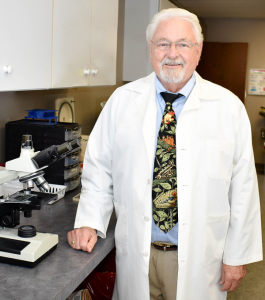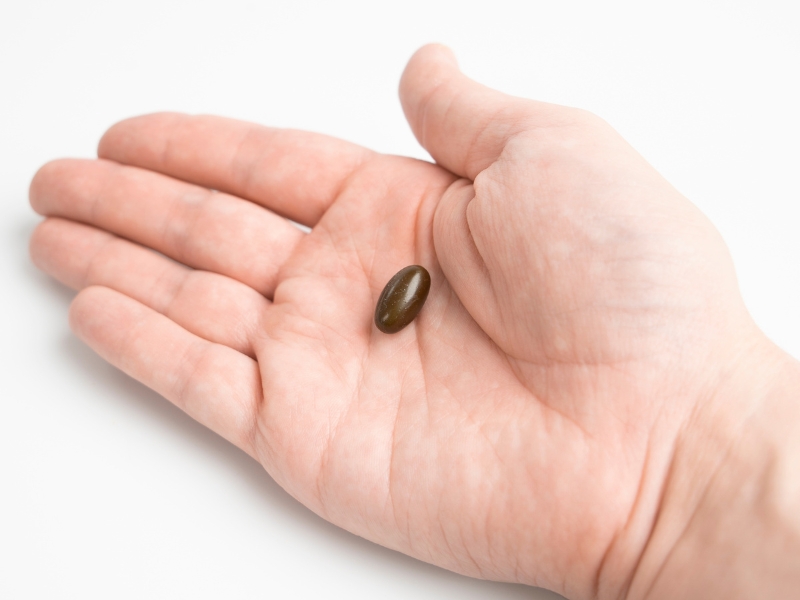
Dr. William V. Judy, founder and president of SIBR Research Institute, has done studies of Coenzyme Q10 supplementation of patients with chronic heart failure and chronic fatigue syndrome. Generally, after 10 -12 weeks of supplementation, the patients’ symptoms and quality of life improve significantly. However, if the supplementation is stopped, the patients suffer a relapse to their previous condition. Coenzyme Q10 supplementation is a life-long adjuvant therapy.
Coenzyme Q10 is a life-time essential supplement for most people as they get on in years. People who especially need a Coenzyme Q10 supplement – heart failure patients and chronic fatigue syndrome patients, for example – will suffer a relapse if they stop taking their daily CoQ10 supplements.
CoQ10 and the constant need for ATP energy
Dr. William Judy, founder and president of the SIBR Research Institute, tells me that the life-long need for Coenzyme Q10 supplementation is related to the cells’ constant need for ATP energy.
Excesses of ATP energy cannot be stored. The cells must produce ATP energy when they need the energy. CoQ10 is a vital co-factor in the production of ATP energy in the cells.
Antioxidant role of Coenzyme Q10 also a constant need
Another feasible explanation for the continuing need for Coenzyme Q10 supplementation is the antioxidant role of the reduced form of Coenzyme Q10. We know that the cells produce free radicals in the process of producing energy. Some of these radicals can have harmful effects if they are not neutralized by antioxidants.
The manifest importance of the redox mechanism of CoQ10
The ubiquinol form of Coenzyme Q10 results from the reduction of the ubiquinone form during the cellular process of energy production. This reduced form of Coenzyme Q10 has two extra electrons to donate to the cause of scavenging free radicals. It is the ability to donate those extra electrons to unstable free radicals that makes the ubiquinol form of Coenzyme Q10 valuable as an antioxidant. Making the reduced Coenzyme Q10 even more valuable is the fact that it is a fat-soluble antioxidant.
Because it is a redox molecule, Coenzyme Q10 has the ability to convert back and forth many times from its oxidized form (ubiquinone) to its reduced form (ubiquinol) and back again to its ubiquinone form. Dr. Judy has often remarked how fortunate it is that we have a substance that helps our cells produce energy and helps to prevent oxidative damage to our cells.
CoQ10 and other antioxidants
Dr. Judy feels strongly that we need more research into the roles and functions of the most important endogenous antioxidants and the exogenous antioxidants together with the antioxidant role and function of CoQ10.
Dr. Judy asks:
- Are there specific functions for each form of antioxidant?
- Do all the various antioxidants work singly or together or both?
- What is the importance of the concentration distribution for each antioxidant in the body (extracellular versus intracellular concentration)?
- If the various antioxidants all work together, is there a pecking order in which they neutralize harmful free radicals?
Coenzyme Q10 and the endogenous antioxidants
What are the endogenous antioxidants that Dr. Judy is thinking about?
- Superoxide dismutase enzymes help to decompose superoxide radicals to hydrogen peroxide and oxygen.
- Catalase enzymes help to break down hydrogen peroxide molecules to water and oxygen.
- Glutathione peroxidase enzymes – enzymes containing selenium – also help to break down hydrogen peroxide radicals and to reduce organic peroxide radicals to alcohols.
Numerous clinical trials have shown that daily supplementation with Coenzyme Q10 – usually on the order of 100 – 300 milligrams per day – is associated with significantly with the increased activity of these three endogenous antioxidant enzymes.
Coenzyme Q10 and the exogenous antioxidants
What are the exogenous antioxidants that Dr. Judy is thinking about?
- Vitamin C
- Vitamin E
- Various selenoproteins
- Various flavonoids (phytonutrients found in vegetables and fruits – think: green tea)
- Polyphenols (phytochemicals found in plants — think: blueberries)
The reduced form of Coenzyme Q, ubiquinol, can neutralize harmful free radical reactions by itself, and it can enhance antioxidant activity by reducing exogenous antioxidants such as vitamin C and vitamin E.
Persistence of the CoQ10 and selenium supplementation effect in the KiSel-10 study
So, now, given that Coenzyme Q10 supplementation should be considered a life-long necessary supplement for people with low-energy syndrome conditions, how do we explain the persistent effect of the four-year combined Coenzyme Q10 supplementation in Professor Urban Alehagen’s KiSel-10 study?
In Dr. Alehagen’s study, the senior citizens who received the active treatment — the Coenzyme Q10 and the high selenium yeast — had less risk of death from heart disease 10 and 12 years after the supplementation.
Possible explanations:
- Conjecture: Many of the the KiSel-10 study participants have gone out and bought CoQ10 and Selenium supplements after the end of the study.
They have been told that the active treatment had good effects. They have been told what the active treatment was. They can buy the supplements in their local drugstores.
- Conjecture: The senior citizens who got the active treatment during the four-year study got a four-year advantage over the senior citizens who got the placebo treatments.
They got a four-year advantage of less oxidative stress, less inflammation, less diminution of endothelial function, and less fibrosis.
- Conjecture: Professor Alehagen speculates “that permanent or progressive structural changes took place in the subjects of the placebo group during the interventional four-year period, explaining the apparent slowing down of cardiovascular pathogenesis in the supplemented group” [Alehagen 2018].
Note: “Pathogenesis” is Professor Alehagen’s term for the development of disease, in this case, heart disease.
Note: In speculating about “structural changes” that did or did not take place during the four-year period of supplementation with Coenzyme Q10 and selenium-enriched yeast, Professor Alehagen could be thinking of epi-genetic changes.
Epi-genetics is a term meaning “above genetics.” Epi-genetics describes changes in gene expression and function that do not result from or cause changes in DNA sequence. Epi-genetic changes are thought to be the effect on gene expression of factors in the environment, in nutrition and in social conditions. In the KiSel-10 Study, the combined daily supplementation with Coenzyme Q10 and high-selenium yeast for four years may be an epi-genetic factor.
- Conjecture: Moreover, Professor Alehagen also speculates that “the long-lasting effect of the supplementation might also be related to the fact that a major component of yeast selenium is selenomethionine, which is, at the expense of methionine, incorporated into non-seleno proteins, which constitute the unspecific selenium pool having a long elimination half-life” [Alehagen 2018].
Remember, the senior citizens taking part in the KiSel-10 study were people living in a selenium-poor region of the world.
Coenzyme Q10 is a life-time supplement
For most of us, when we reach our 40s and beyond, our cells will be producing considerably less Coenzyme Q10, and the decline in endogenous CoQ10 production will continue the rest of our lives.
- But our cells’ need for ATP energy production will not decrease appreciably.
- Nor will the cells’ need for antioxidant protection decrease.
- We cannot hope to make up for the decline in CoQ10 production by eating more carefully.
- Supplementation with CoQ10 is a necessary life-long project.
Coenzyme Q10 supplements affordable, effective, and safe
There is no research in humans showing that it is necessary to take a ubiquinol supplement to get a decent CoQ10 absorption and elevated ubiquinol concentrations in plasma and lipoproteins.
There is research showing that taking a good ubiquinone CoQ10 supplement will result in elevated plasma and lipoprotein CoQ10 concentrations [Mohr 1992].
The form of the Coenzyme Q10 supplement — whether ubiquinone or ubiquinol — does not seem to be as important as the composition and formulation of the oil matrix in which the Coenzyme Q10 supplement is dissolved to single molecules from the original crystalline raw material [Lopez-Lluch 2018].
The proper formulation will give a superior absorption and efficacy, but it may well cost more in production.
The cheaper CoQ10 products on the market are not likely to give a good absorption and good health effects. Coenzyme Q10 is too important to your cells for you to gamble on a cheapie product.
Read our key article about CoQ10 and cardiovascular health in elderly people
Read our key article on CoQ10 as adjuvant therapy for heart failure
Sources
Alehagen, U., Aaseth, J., Alexander, J., & Johansson, P. (2018). Still reduced cardiovascular mortality 12 years after supplementation with selenium and coenzyme Q10 for four years: A validation of previous 10-year follow-up results of a prospective randomized double-blind placebo-controlled trial in elderly. Plos One, 13(4), e0193120. doi:10.1371/journal.pone.0193120
Alehagen, U., Johansson, P., Björnstedt, M., Rosén, A., & Dahlström, U. (2013). Cardiovascular mortality and N-terminal-proBNP reduced after combined selenium and coenzyme Q10 supplementation: a 5-year prospective randomized double-blind placebo-controlled trial among elderly Swedish citizens. International Journal of Cardiology, 167(5), 1860-1866.
López-Lluch, G., del Pozo-Cruz, J., Sánchez-Cuesta, A., Belén Cortés-Rodríguez, A. & Navas, P. (2018). Bioavailability of coenzyme Q10 supplements depends on carrier lipids and solubilization. Nutrition (in press). doi: https://doi.org/10.1016/j.nut.2018.05.020. Print publication scheduled for January 2019.
Mohr, D., Bowry, V. W., & Stocker, R. (1992). Dietary supplementation with coenzyme Q10 results in increased levels of ubiquinol-10 within circulating lipoproteins and increased resistance of human low-density lipoprotein to the initiation of lipid peroxidation. Biochimica et Biophysica Acta, 1126(3), 247-254.
Mortensen, S. A., Rosenfeldt, F., Kumar, A., Dolliner, P., Filipiak, K. J., Pella, D., & Littarru, G. P. (2014). The effect of coenzyme Q10 on morbidity and mortality in chronic heart failure: results from Q-SYMBIO: a randomized double-blind trial. JACC. Heart Failure, 2(6), 641-649.
The information presented in this review article is not intended as medical advice and should not be construed as such.








Leave A Comment